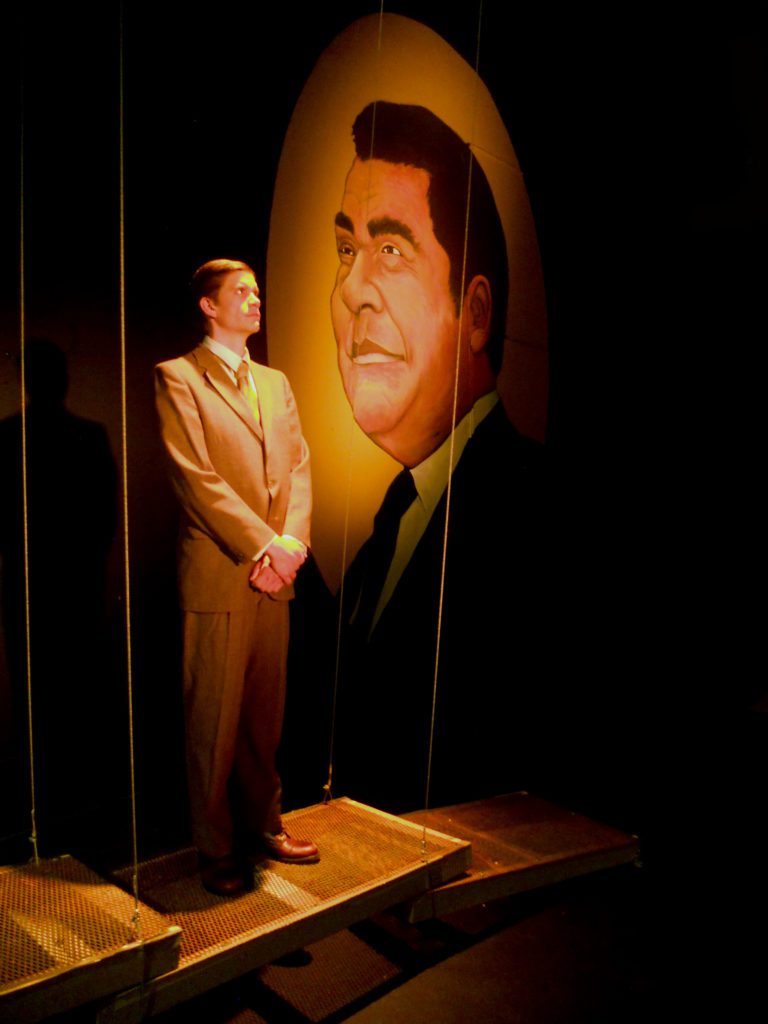Given the fact that Denver’s Buntport Theater has a hard time categorizing its newest collaborative creation, it’s a tough show to pigeonhole. But then, maybe that’s the point.
The group, which has created some of the most innovative and vigorous stage works of the past two years, calls “The 30th of Baydak” “a dark comedy…or a light drama…or a medium dramedy.” What transpires is a starkly played but densely layered piece that transcends easy classification, a challenging, pungent essay on fear, control, and human weakness that proves once again that these folks are driving theater into heady new territory.
The play, based equally on real-life events in the former Soviet republic of Turkmenistan, and the writing of Kafka and Czech novelist Bohumil Hrabal (best known as the source for Jiri Menzel’s films “Closely Watched Trains” and “Larks on a String”), deals with an unassuming bureaucratic functionary, Yousef (Erik Edborg). He waddles hesitantly to his office each day, where his task is to excise the “obsolete” names of months from Turkmen documents and pass them down the pipeline. Those who recall “freedom fries” will get the parallel to our own blinkered, unthinking acceptance of the party line.
| photo by Sandra H. Elkind |
It seems that the country’s dictator, who has renamed himself Turkmenbashi, “the ruler of all Turkmen,” has declared that more patriotic titles are needed for the months of the year, and has set out to systematically change all of them. Yousef works alongside true believer Ogul (Hannah Duggan), putative rebel Farzad (Evan Weissman), and fetching new coworker Meret (Erin Rollman), who he’s too timid to look at but begins to feel longings for.
Portraits of Turkmenbashi dominate the stage space, genuflected to by all (except the sarcastic Farzad, who gripes incessantly but doesn’t seem to have the moxie to stand up for his beliefs). Patriotic poems, slogans, and songs issue from the radio, and everyone seems wise to keep their heads down and conform. This Yousef does, although he feels an inarticulate compulsion to secret the cutout scraps in his pockets and take them home, squirreling them away in boxes under his bed.
The endless round of tedium continues, day after day, as the workers file in and out of the office, moving on platforms that are suspended on wires from Buntport’s ceiling grid. Actually, everything – desks, chairs, decorations, beds – are hanging in midair, a clever and eloquent staging that point to the puppet strings the characters seem to dangle from, and the fear-laden, tentative existence they are forced to endure.
Yousef confides only in his roommate, a talking camel in business suit, Ismail (Brian Colonna), who advocates a pragmatic, complacent approach to life (“Beer and sandwiches” is his mantra). Yousef finally acts, creating out of his collection of paper scraps a sculpture of Meret’s arms that comes hauntingly to life for a few astonishing moments, breaking out of his self-censored state to contemplate his isolated, pointless point of view.
Still, neither this nor any other action a character undertakes accomplishes anything except to create more pain, or endanger an innocent party. The players’ private bouts of arid philosophizing seem as barren as the Big Brother-esque doubletalk that dominates their public lives. Buntport refuses to supply the audience with easy answers or a satisfying conclusion. What’s the point again?
Perhaps it’s that Buntport’s expectations of the audience are higher than those of any other arts group in the area. This is complex, grown-up stuff, and the clever septet (let’s not forget the contributions of the offstage members, Matt Petraglia and SamAnTha Schmitz) is gutsy enough to demand that we forge our own meanings out of the proceedings. The bleak, fragmentary narrative mirrors the mindsets of those caught within in. This is stage poetry, best compared to the work of Cocteau – unexplained images and actions thrown at us, knocking us off balance and into new modes of thought.
It’s frustratingly difficult stuff, easier to “get” if you have made a point of following the group’s development production by production over the years. Still, anyone sick and tired of spoon-fed, cloying entertainments will find the acrid “Baydak” heady fare.
-Brad Weismann, May 27th, 2003, Colorado Daily
